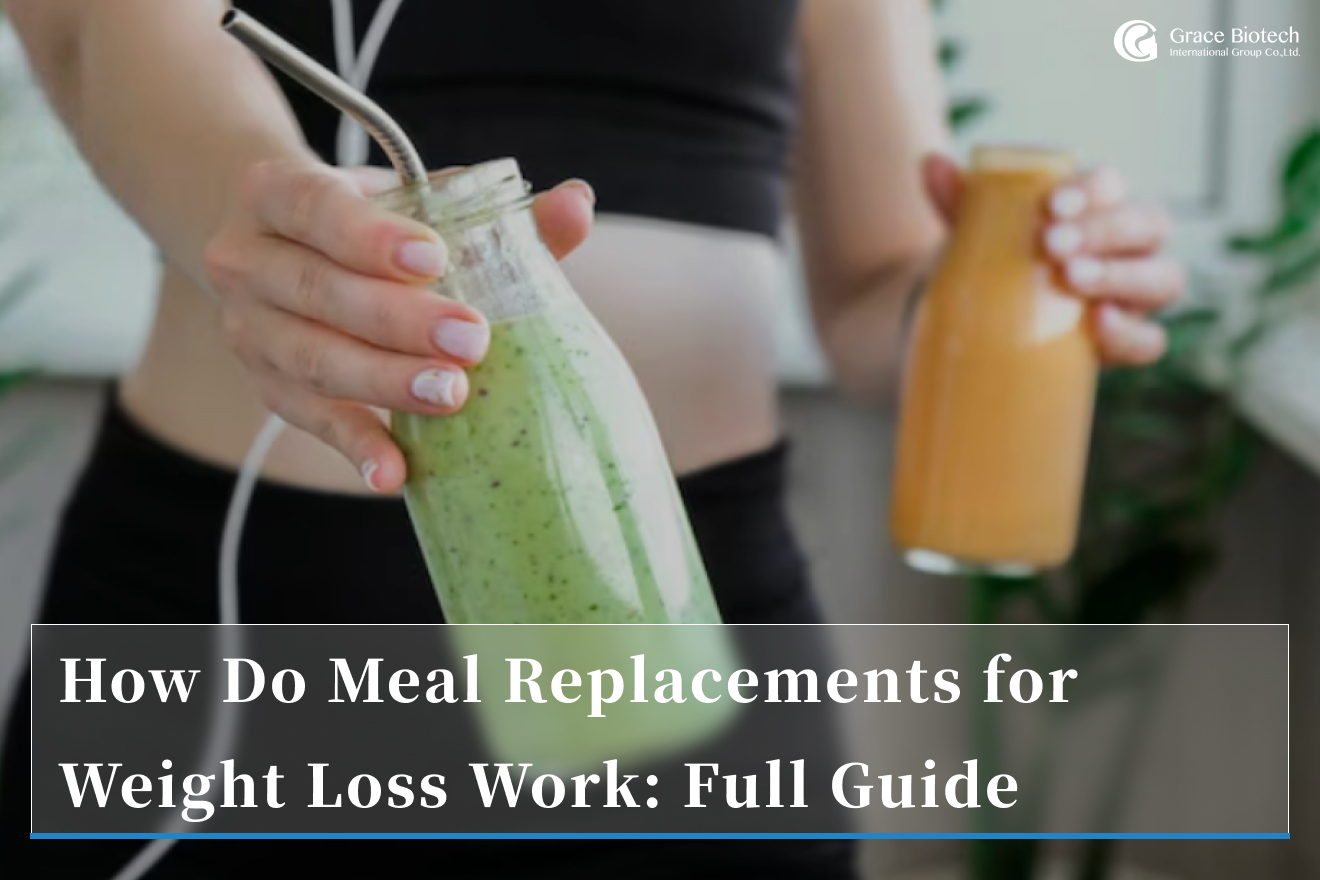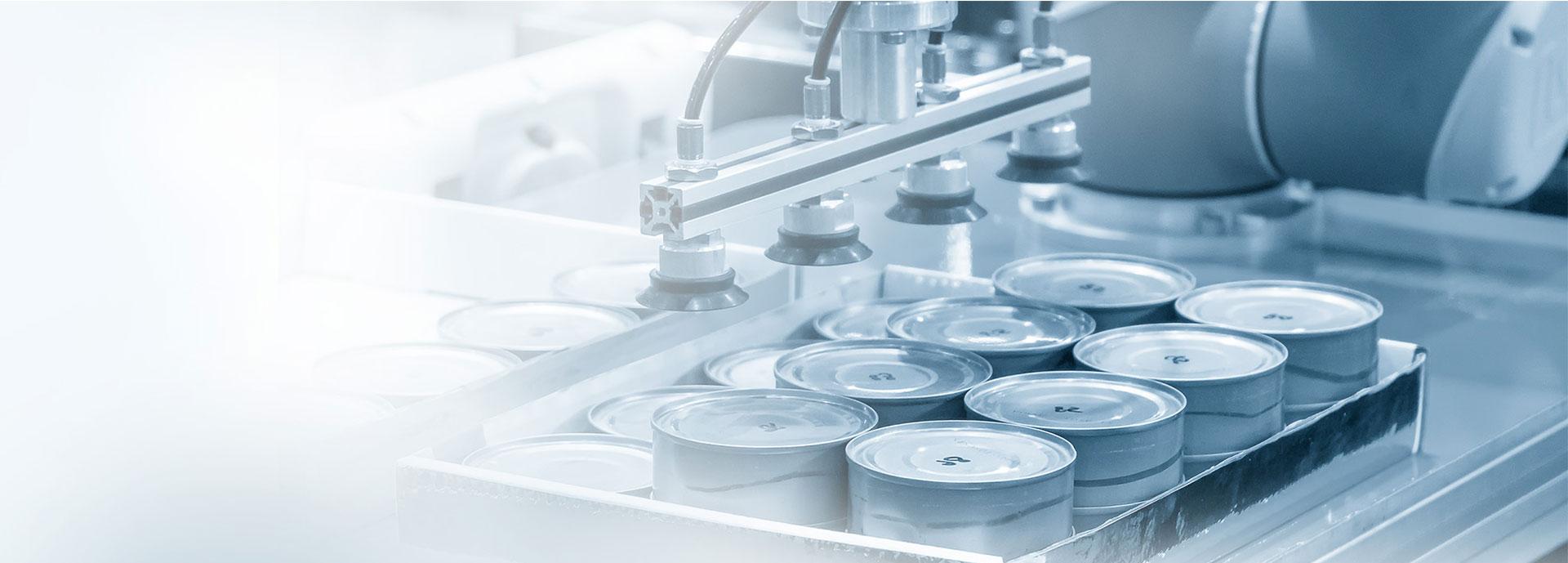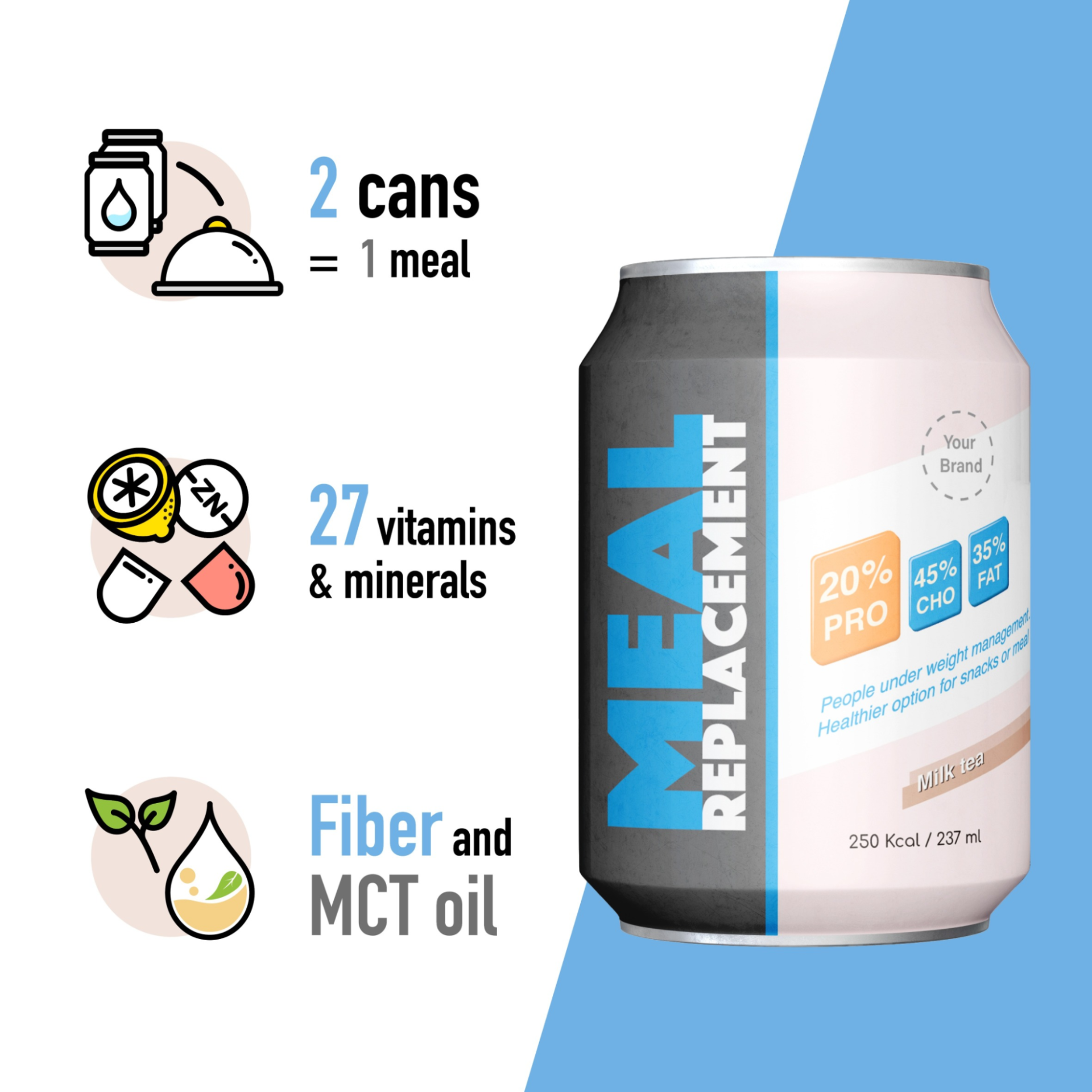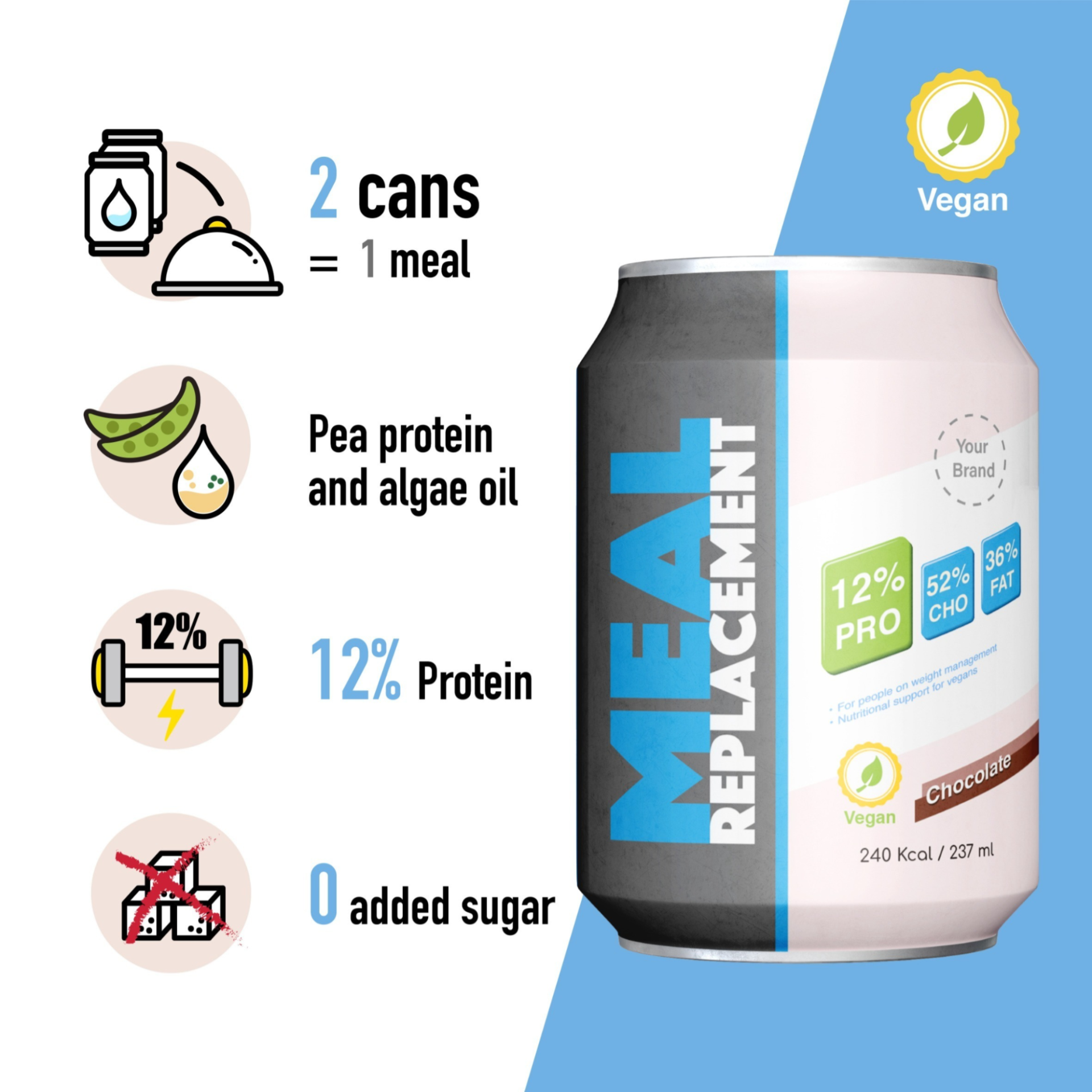Latest
News
How Do Meal Replacements for Weight Loss Work: Full Guide

Maintaining a healthy weight remains a major challenge for many adults. According to the Centers for Disease Control and Prevention (CDC), 42.5% of American adults are classified as obese, increasing the risk of chronic health conditions. In response, many people are turning to meal replacements as a convenient and calorie-controlled approach to managing their diets.
This article explores what makes meal replacements work, their potential benefits and limitations, along with factors to consider when choosing meal replacements for weight loss, and best practices for incorporating them into a healthy weight management plan.
What are Meal Replacements?
Though the Food and Drug Administration (FDA) does not have a standard definition for now, meal replacements usually refer to pre-made products that are specially formulated to substitute a full meal, whether it’s breakfast, lunch, or dinner. Their macronutrient profile may consist of protein, carbohydrates, fats, vitamins, and minerals, and they also deliver a fixed calorie count.
While also available in various forms like bars, powders, and puddings, liquid meal replacements such as shakes or ready-to-drink formulas are often preferred for their smooth texture and ease of consumption. Research by the Journal of the American Dietetic Association even found that liquid meal replacements generally provide faster digestion and absorption in comparison to solid options.
Why Can Meal Replacement Help with Weight Management?

One of the main reasons people turn to meal replacements is the convenience they offer. There’s no need to plan, cook, or portion meals, which makes it easier to stay on track with their dietary plans, even with a busy lifestyle. With each serving pre-measured to provide a fixed number of calories, meal replacements also promote calorie and portion control since people tend to underestimate or overestimate the calories in their food.
In addition, meal replacements help manage hunger by providing a feeling of fullness that reduces the urge to snack between meals or overeat later. This makes it easier to stick to a structured eating schedule, especially for those who tend to skip meals during the day.
By creating predictable meal patterns and eliminating guesswork about portion sizes, meal replacements make it more practical for people to maintain their calorie goals and encourage healthier long-term habits for weight loss.
This effectiveness is supported by scientific research. For instance, a 3-month American Diabetes Association study shows that participants who included meal replacement shakes in their routine lost an average of 7.8% of their initial body weight, while those who relied solely on regular food-based diets lost just 1.5%.
Nutritional Benefits of Having Meal Replacements for Weight Loss
Beyond promoting consistent eating habits, a weight loss meal replacement with the right formulation may also provide nutritional benefits, including:
Balanced Nutrition to Prevent Deficiencies
A 2018 Nutrients research found that extreme weight loss diets that simply reduce food intake or solely rely on specific food groups can cause nutrient deficiencies. Over time, this may lead to fatigue, mood changes, and other health issues, as seen in a 2022 Journal of Preventive Medicine and Hygiene study.
On the other hand, a 2024 Nutrients research shows that individuals who use meal replacements for weight loss were able to achieve their goals while maintaining their metabolism. This shows how a properly formulated meal replacement with essential vitamins and minerals may be a safer weight loss solution than crash diets.
Protein to Preserve Muscle Mass
The body doesn’t just burn fat during weight loss; it can also break down muscle tissue, particularly with calorie-restricted diets, as mentioned by the 2017 Advances in Nutrition and 2021 Nutrients studies.
As the body faces reduced calorie intake, the rate of muscle protein synthesis decreases as well. It can even increase the rate of protein breakdown, which may compromise muscle strength and physical function, especially in older adults or those with pre-existing low muscle quality.
Research in the Asian Journal of Surgery and Clinical Nutrition found that protein-rich meal replacements can help counteract this risk by delivering amino acids in controlled portions. This stimulates muscle protein synthesis to reduce muscle breakdown and preserve lean body mass during calorie restrictions. The effects are even more obvious when the meal replacements are paired with resistance or moderate aerobic exercise.
Dietary Fibers to Support Healthy Digestion
According to research in the American Journal of Lifestyle Medicine, insufficient fiber intake is a common challenge for the general population, not just those with restrictive, low-calorie weight loss diets. This can disrupt the microbiome within the gut, causing digestive issues like constipation and bloating, as revealed by a study published in Microorganisms.
To address this, people may choose to rely on meal replacements to meet their dietary fiber needs for weight management, such as the participants in the Thai Journal of Public Health’s study. In addition to promoting satiety and curbing cravings, a meal replacement containing enough dietary fiber can support regular bowel movement, as dietary fibers help bulk up the stool to improve stool frequency.
Challenges of Having Meal Replacements for Weight Loss
While meal replacements can help manage calories, simplify meals, and provide nutritional benefits, they are not intended as long-term food replacements. Relying exclusively on shakes or bars may deprive your body of the more complex nutrients found in fresh fruits, vegetables, whole grains, and lean proteins. Some people even lose their appetite due to the limited food variety.
Moreover, the product quality may be inconsistent between brands, with varying calorie amounts, protein content, fiber levels, and micronutrient profiles, so not every meal replacement can meet nutritional needs. Some even contain artificial coloring and fillers that may be poorly absorbed or cause digestive discomfort.
Plus, some meal replacements contain dairy, soy, and/or gluten. This makes them unsuitable for people with allergies or intolerances. Those with plant-based diets may also find their options limited because of these ingredients.
How to Choose the Right Weight Loss Meal Replacement?

Now that you understand the potential challenges of using meal replacements, it’s important to know how to choose products that truly support your goals. Here are key reminders to help you find effective and healthy meal replacement shakes for weight loss:
-
Select Products from a Reputable Brand: Always choose meal replacements from trusted manufacturers that provide transparent ingredient lists and third-party testing. Reputable brands are also more likely to meet nutritional standards, ensure product safety, and use higher-quality raw materials.
-
Check Protein Type and Content: Among the many protein varieties in weight loss meal replacements, whey is recommended as it offers fast absorption. For those avoiding dairy or having plant-based diets, peas, rice, or soy provide a complete amino acid profile for those avoiding dairy. Also, look for at least 20-30 grams of protein per serving, as recommended by The American Journal of Clinical Nutrition.
-
Evaluate Calories per Serving: According to dietitians of the Ohio State Wexner Medical Center, your meal replacement should provide 1/3 of your daily calorie goal, if you will have 3 meals. For instance, if you need 1,500 calories a day, your meal replacement should have about 400-500 to meet your goal. Options with lower calories may be better suited as snacks rather than full meal substitutes.
-
Look for Micronutrients and Fiber: Choose options that include essential vitamins and minerals such as iron, calcium, and vitamin D, along with at least 5 grams of dietary fiber, as suggested by a Nutrition Journal research, to support digestion and prolong fullness.
-
Consider Flavor and Convenience: A meal replacement that tastes good and fits your routine makes you more willing to have it. Test different flavors, textures, and forms (like ready-to-drink bottles vs. powders) to find what works best for your lifestyle. After all, consistency is one of the most crucial factors for long-term success in weight management.
Best Practices for Using Meal Replacements in a Weight Loss Plan
On top of choosing the right meal replacement product, anyone trying to lose weight should also follow these best practices for sustainable, long-term results:
Use for 1–2 Meals Daily, Not Every Meal
Studies in the Journal of the Academy of Nutrition and Dietetics suggest that substituting 1 or 2 meals a day with meal replacements is most effective for weight management. As we mentioned, using meal replacements for every meal can lead to boredom since there is a lack of variety, which is why the method of replacing all three meals is generally reserved for short-term, medically supervised Very Low-Calorie Diets (VLCDs).
Pair with Whole Foods for Diversity
The remaining meal(s) and any snacks should focus on whole, unprocessed foods like lean proteins, fresh fruits, and vegetables. This provides complex nutrients and phytochemicals, as well as textural variety, which the meal replacements cannot fully replicate. In turn, the person can enjoy their meals better and become more likely to follow through with their weight loss plan.
Monitor Overall Calorie Intake
Studies in the Journal of Obesity & Metabolic Syndrome consistently show that creating a modest calorie deficit of around 500 calories per day can lead to a steady weight loss. So even though meal replacements control the calories for the meal they replace, you must remain mindful of your total daily caloric intake.
Consuming a meal replacement alongside a usual, high-calorie diet without reducing other meals or snacks will defeat the weight loss benefits. If you aren’t sure about how many calories to consume, always consult your dietitian or healthcare provider for professional guidance.
Combine with Physical Activity
Pairing meal replacements with regular exercise maximizes fat loss for long-term weight management while preserving lean muscle mass. For adults, the CDC recommends at least 150 minutes of moderate aerobic activity plus 2 days of muscle-training sessions weekly for optimal health. Although 150 minutes seems like a lot, you can actually break it down into 30 minutes a day for 5 days a week, making this activity more manageable.
More FAQs About Weight Loss Meal Replacements
Q1. What’s the difference between meal replacements and protein shakes?
Meal replacements and protein shakes serve different dietary purposes:
Meal replacements are formulated to serve as a balanced alternative to a full meal. They usually contain a mix of protein, complex carbohydrates, healthy fats, dietary fiber, and essential micronutrients. Because of these contents, meal replacement shakes help manage hunger, maintain energy, and support weight management.
In contrast, protein shakes primarily boost protein intake. They’re often used after workouts to support muscle repair and recovery, or as a quick supplement when your meals lack sufficient protein. These shakes are typically low in calories and carbohydrates, offering limited amounts of other nutrients like vitamins, minerals, or healthy fats. So, protein shakes alone aren’t meant to replace an entire meal.
Q2. Is it safe to have meal replacement shakes every day?
Yes, it is generally safe to include meal replacement shakes daily as part of a weight loss strategy, provided they are high-quality and nutritionally complete. However, they should not replace all of your meals, as whole foods like fruits, vegetables, lean proteins, and whole grains are crucial for fostering healthy eating habits.
Q3. Who can benefit from meal replacements?
Meal replacements can benefit anyone looking to manage or lose weight by helping control calorie intake while maintaining balanced nutrition. They’re also useful for busy individuals who often skip meals, people with limited appetite or difficulty preparing food, and those recovering from illness or surgery who need an easier way to meet nutrient needs, as guided by professional dietitians or healthcare providers.
Q4. Who should avoid meal replacements?
Meal replacements aren’t suitable for everyone. People with chronic health conditions, like kidney or heart disease, may need to limit protein, sodium, or certain nutrients found in meal replacements. Those with severe food allergies or intolerances, whether towards dairy, soy, or gluten, should also check ingredients carefully.
Furthermore, individuals managing blood sugar levels, pregnant or breastfeeding women, and anyone taking prescription medications should consult a healthcare professional beforehand to ensure the meal replacements are appropriate for their diets.
Q5. Are meal replacements good for weight loss?
Yes, meal replacements can be an effective weight loss tool. They simplify calorie control, help manage hunger, and encourage consistent meal patterns, making it easier to stick to a weight loss plan. Properly formulated options also provide balanced nutrition, including protein to preserve muscle mass and fiber to support digestion, reducing the risks of nutrient deficiencies.
Consequently, research shows that participants using meal replacements may lose more weight while maintaining metabolism and lean body mass compared to traditional calorie-restricted diets.
Grace Biotech: Your Partner for Meal Replacement Development
For brands looking to enter the weight management market, Grace Biotech offers reliable expertise in developing custom formulation and private-label meal replacement solutions. With a focus on balanced nutrition, high-quality ingredients, and consumer convenience, we help brands create ready-to-drink supplements that meet health goals and market demands.
Here are some of the products that we offer:
|
|
Meal Replacement Our Meal Replacement formula combines high dietary fiber for satiety, 20% of calories from high-performance protein, and 27 essential vitamins and minerals, including calcium and vitamin D for bone health support.
|
|
|
Vegan Meal Replacement Our Vegan Meal Replacement offers balanced nutrition with high fiber content and a high PDCAAS score using pea protein.
|
Let Grace Biotech bring your meal replacement vision to life.
Learn more about our expertise and contract supplement manufacturing services today.
Resources:
[1] April J Stull, John W Apolzan, Anna E Thalacker-Mercer, Heidi B Iglay, Wayne W Campbell. Liquid and Solid Meal Replacement Products Differentially Affect Postprandial Appetite and Food Intake in Older Adults. J Am Diet Assoc. 2008 Sep 29. doi: 10.1016/j.jada.2008.04.014.
[2] Jacqueline Craig. Meal Replacement Shakes and Nutrition Bars: Do They Help Individuals With Diabetes Lose Weight?. Nutrition FYI. 2013 Aug 01. https://doi.org/10.2337/diaspect.26.3.179.
[3] Matthew G Engel, Hua J Kern, J Thomas Brenna, Susan H Mitmesser. Micronutrient Gaps in Three Commercial Weight-Loss Diet Plans. Nutrients. 2018 Jan 20. doi: 10.3390/nu10010108.
[4] Aysha Karim Kiani, Kristjana Dhuli, Kevin Donato, Barbara Aquilanti, Valeria Velluti, Giuseppina Matera, Amerigo Iaconelli, Stephen Thaddeus Connelly, Francesco Bellinato, Paolo Gisondi, Matteo Bertelli. Main nutritional deficiencies. J Prev Med Hyg. 2022 Oct 17. doi: 10.15167/2421-4248/jpmh2022.63.2S3.2752.
[5] Botian Chen, Shiyi Hong, Yuyang Wang, Qiang Hu, Defu Ma. Efficacy of Meal Replacement Products on Weight and Glycolipid Metabolism Management: A 90-Day Randomized Controlled Trial in Adults with Obesity. Nutrients. 2024 Sep 28. doi: 10.3390/nu16193284.
[6] Edda Cava, Nai Chien Yeat, Bettina Mittendorfer. Preserving Healthy Muscle during Weight Loss. Advances in Nutrition. 2017 May 05. doi: 10.3945/an.116.014506.
[7] David McCarthy, Aloys Berg. Weight Loss Strategies and the Risk of Skeletal Muscle Mass Loss. Nutrients. 2021 Jul 20. doi: 10.3390/nu13072473.
[8] ChiouYi Ho, Siti Nuraini Mohd Samwil, Zuliehaiza Kahairudin, Norshariza Jamhuri, Adibah Abd Aziz. Pre-habilitation with exercise and high whey-protein-based meal replacement therapy promotes weight loss and preserves muscle mass before bariatric surgery. Asian Journal of Surgery. 2023 Mar 16. doi:10.1016/j.asjsur.2023.03.026.
[9] Robert H Coker, Kenneth Shin, Kristen Scholten, Michelle Johannsen, Jean Tsigonis, Il-Young Kim, Scott E Schutzler, Robert R Wolfe. Essential Amino Acid-Enriched Meal Replacement Promotes Superior Net Protein Balance in Older, Overweight Adults. Clin Nutr. 2018 Dec 19. doi: 10.1016/j.clnu.2018.12.013.
[10] Diane Quagliani, Patricia Felt-Gunderson. Closing America’s Fiber Intake Gap. Am J Lifestyle Med. 2016 Jul 07. doi: 10.1177/1559827615588079.
[11] Jiongxing Fu, Yan Zheng, Ying Gao, Wanghong Xu. Dietary Fiber Intake and Gut Microbiota in Human Health. Microorganisms. 2022 Dec 18. doi: 10.3390/microorganisms10122507.
[12] Chanchira Phosat, Akkarach Bumrungpert, Patcharanee Pavadhgul. Short-Term Benefits of High Protein, High Fiber Meal Replacements for Weight Loss in Overweight and Obese Adults. Thai Journal of Public Health. 2025 Apr 30.
[13] Layman Donald K, Anthony Tracy G, Rasmussen Blake B, Adams Sean H, Lynch Christopher J, Brinkworth Grant D, Davis Teresa A. Defining meal requirements for protein to optimize the metabolic roles of amino acids. The American Journal of Clinical Nutrition. 2015 Apr 29. doi: 10.3945/ajcn.114.084053.
[14] Matthew Black. From protein shakes to peptides, here’s what to know about meal supplements. Ohio State Health and Discovery. 2025 Aug 22.
[15] Judith M Ashley, Holly Herzog, Sharon Clodfelter, Vicki Bovee, Jon Schrage, Chris Pritsos. Nutrient adequacy during weight loss interventions: a randomized study in women comparing the dietary intake in a meal replacement group with a traditional food group. Nutr J. 2007 Jun 25. doi: 10.1186/1475-2891-6-12.
[16] Jihyun Min, Seo-Young Kim, In-Soo Shin, Young-Bae Park, Young-Woo Lim. The Effect of Meal Replacement on Weight Loss According to Calorie-Restriction Type and Proportion of Energy Intake: A Systematic Review and Meta-Analysis of Randomized Controlled Trials. Journal of the Academy of Nutrition and Dietetics. 2021 Jul 21. doi: 10.1016/j.jand.2021.05.001.
[17] Ju Young Kim. Optimal Diet Strategies for Weight Loss and Weight Loss Maintenance. J Obes Metab Syndr. 2020 Oct 27. doi: 10.7570/jomes20065.



